Marie Smith, CIO and Co-Founder of Data 360, is a prolific leader, advisor, coach and mentor who works and advocates locally, regionally and nationally for digital and technology literacy, closing the economic gap using technology and ethical, equitable and explainable AI. Data 360 helps non-technical business users establish, grow and optimize their communities using our big data, AI and machine learning services which can save up to 90% of operational costs. Marie has been a speaker/presenter, lectured at and produced curriculum for over 10,000 elementary, middle, high school, college students and workers online and in-person about coding, career development, corporate data analysis, data science and technology development with Harvard Innovation Lab, the University of Southern California, University of California Berkeley, Los Angeles Trade Tech College, California State University Dominguez Hills, conferences and corporations throughout the United States and Europe.
What does “entrepreneurship” mean to you?
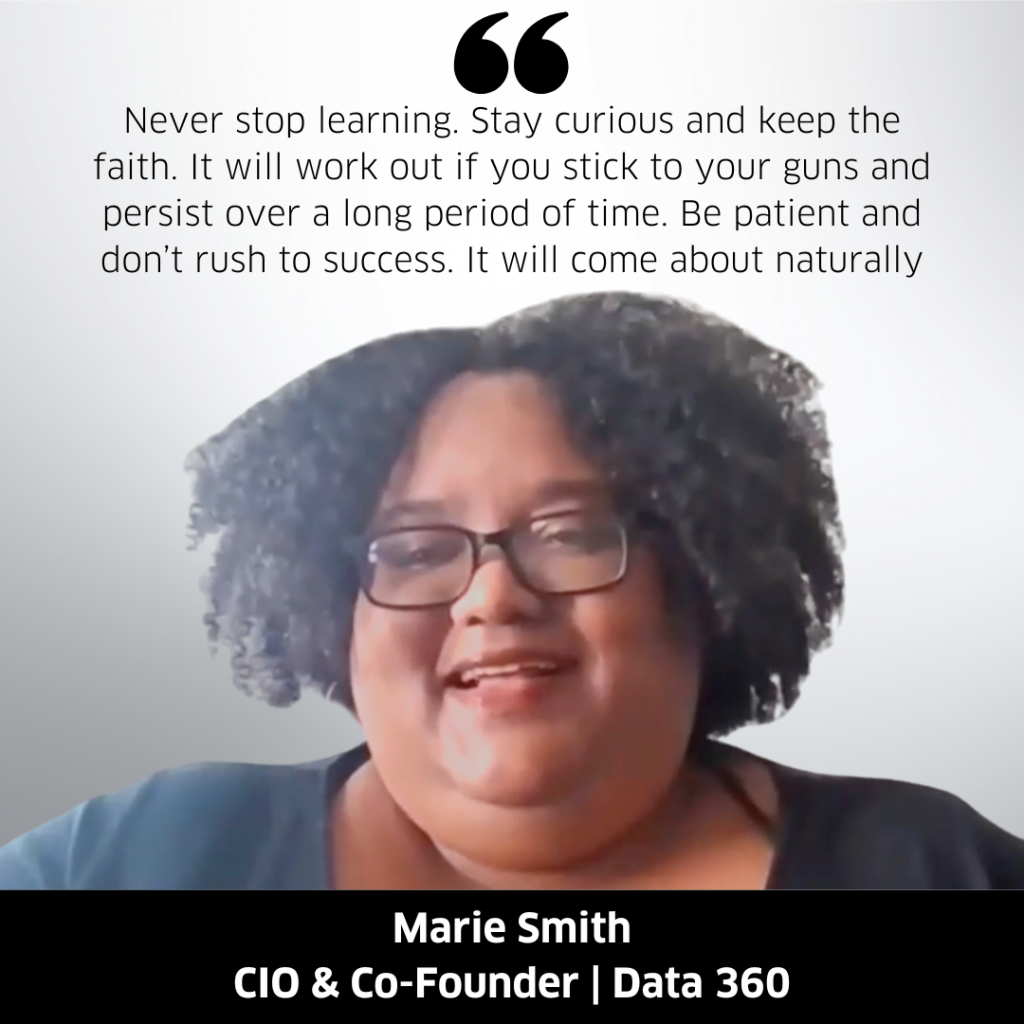 Marie Smith: One of the secrets of successful entrepreneurs is that they do not follow what others have done—they follow their own path. They use their creativity and knowledge to make their vision a reality. To me, entrepreneurship in its best form is the ultimate highest expression of human creativity.
Marie Smith: One of the secrets of successful entrepreneurs is that they do not follow what others have done—they follow their own path. They use their creativity and knowledge to make their vision a reality. To me, entrepreneurship in its best form is the ultimate highest expression of human creativity.
Tell us about your first experience with entrepreneurship.
MS: My first experience with entrepreneurship was selling some items for school and we got to keep the cash and revenue share with the company. I thought that revenue sharing was amazing and I was hooked. I didn’t know anyone in my life who had done that before. It got me hooked on sales at an early age.
What is your company’s origin story? What is the biggest reason you started your business? What did those early days look like and teach you?
MS: Previously I was working with Rakuten on helping a pool of 2,000+ companies learn about social media advertising before Facebook and Twitter went public. Then I went through a major midlife crisis, had to stop working in social media and was racially targeted so I wound up working with the ACLU and lobbying for human, social and criminal justice reform. During that time, I kept hearing that lawmakers needed the data for this and the data for that. I was so surprised. Here, Sacramento is so close to Silicon Valley and why didn’t they have ready access to data. Why weren’t Google and other companies sharing the top technologies with the governments, nonprofits and advocacy groups? I found the disconnect to be absurd. So I offered to help my ACLU colleagues with any data project that they have. Just a few weeks later they called me to come in and work on a secret project. That project wound up using data to model corrupt expenditures with the state of California where money was supposed to go to community organizations for criminal justice reform and it was going to sheriff departments and probation officers instead. The work got published in the NYTimes, LA Times, PBS and NPR. It was a hit!!! And that was the beginning of the company being born for real. We had done some initial consulting, but that was when we were clear that we were on to a market that wasn’t being served. We launched the companies by meeting our clients in Starbucks and gradually co-working spaces.
What do you wish you knew when you started? Is there anything you would do differently?
MS: My co-founders and I had all started businesses before, so we came in with a definitive wish list of how we wanted to see and grow the company. We make most of our choices on purpose.
What does “success” look like for you?
MS: We’re really looking to grow to a large tech company that services businesses globally. We have some great mentors who run large companies and a network of supporters who are immensely experienced in large markets. So, we are blessed with everything we need to grow to a large tech company.
What is your superpower as an entrepreneur?
MS: My superpower is that I am a holistic and creative thinker with a ton of analytical and technical skills. I can envision many different possibilities and create the systems to implement them.
What are your personal driving principals, your top values?
MS: I have two main principles. What would love do? Ahimsa — Respect for all living things and avoidance of violence toward others. That’s all forms for violence — verbal, mental, psychological, physical and any combination of internal or external actions. I really monitor my energy closely.
How have your personal principles and values shaped your company’s values and principles?
MS: We strive to leave everyone better off than where we found them, and we also form partnerships where we have a no abuse policy. We don’t abuse our community members and we don’t allow them to abuse us or others. We form fair agreements and we follow them for the relationships we form. When someone wants to change the relationship or agreement, we strive to be fair to both parties. Ninety percent of the time fairness is completely available and works.
What’s it like to work alone or with your partners?
MS: My co-founders and I and our corporate and community partners work in a collaborative fashion and strive to benefit each other in the biggest ways possible. Each one of our co-founders has their superpower and specialty and the same with our partners. This way of working has allowed us to have a large capacity while maintaining a small footprint and overhead. This keeps us extremely profitable.
Have you raised outside capital so far?
MS: No, we organically grew and reinvested our revenue. We have gotten cash and software grants over the years. We wanted to experience our customers’ needs without interference and the pressure to meet some investor standard that may not make sense for our company.
If you have chosen to fundraise, how long have you been in that process?
MS: We are fundraising now that we have established all of the foundation of the company and earned substantial revenue.
Where do you meet investors?
MS: Investors are our clients and we help their clients or funds grow through helping them find new LPs or partners.
How has your network helped you raise capital?
MS: Investors in our network have introduced us to other investors in our network for future fundraising when we are ready.
Do you have a mentor?
MS: I have several. My mentors help me see the bigger picture and not get too caught up in the small things of the moment which I deeply appreciate.
What role does mentorship play in your world (as a mentor or mentee)?
MS: I’m the mentor to many entrepreneurs or aspiring entrepreneurs. I also have several mentors. As a mentor, I focus on really listening 90% of the time and providing my mentees with an eye on how to quickly and creatively make a profit so that they can build out their companies properly. As a mentee, my mentors keep us grounded in how we can effectively grow into a large company.
Many entrepreneurs continue to perfect their daily routines to support their work and greater vision; would you mind sharing your morning routine or a regular ritual that grounds your work each day?
MS: Meditation and working with my husband to communicate about our daily routine has been successful. We both work from home and have ways to work together and give each other space and personal time. It’s an awesome balance, but it only works because we spent a lot of time communicating with each other and we both value our meditation and prayer time to get refocused.
What are you reading or have read?
MS: I love “Hope is not a Strategy”. It’s my favorite sales book and I have read it over and over again.
Where do you go for inspiration?
MS: I go to spiritual texts for inspiration. It reminds me of the ancient history of the world and that there are really not any fundamentally different and new problems from ancient times until now.
What is a problem that keeps you up at night?
MS: I don’t allow problems to keep me up at night. There are times when I worry briefly and I keep in mind that we have been organically solvent for 90% of our journey and we have built solid and sustainable relationships and my worry warts go away. I worry about my kids and grandkids at times also, but I’ve been blessed to see a lot of my family members grow to an old age so I just pray for them and keep tabs on them.
How do you think about helping others through your work?
MS: Helping others is the primary focus of our company. We strive to accelerate growth and help develop more and more diverse economies globally. Our motto is expanding possibilities.
What advice do you have for fellow (and aspiring) entrepreneurs building and leading teams?
MS: Never stop learning. Stay curious and keep the faith. It will work out if you stick to your guns and persist over a long period of time. Be patient and don’t rush to success. It will come about naturally.
What kind of an entrepreneur do you want to be known as – as in, what do you want your legacy to be?
MS: My legacy is as an innovator, a peacemaker, a muse and a merrymaker.
Do you have someone you’d like to nominate to be profiled in our Faces of Entrepreneurship series? Please let us know by emailing media@thecenter.nasdaq.org or submit your nomination using this form.
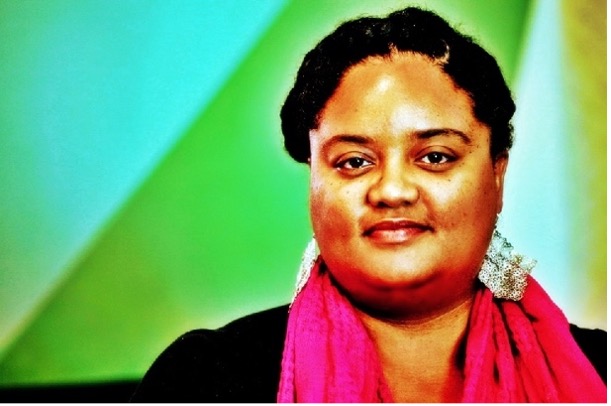
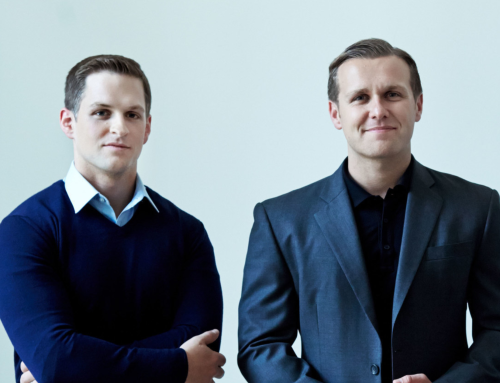
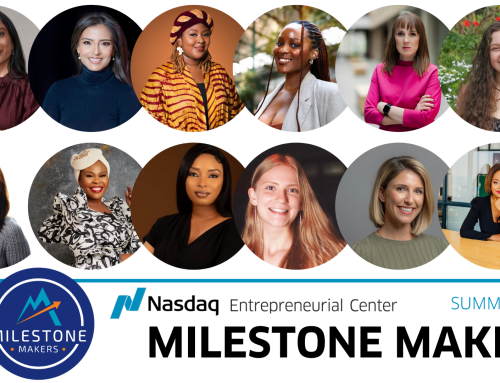
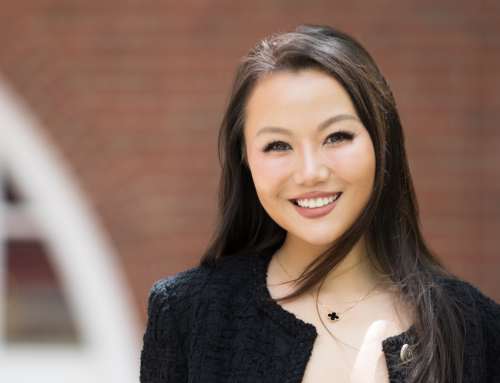
Invite a Friend
Close